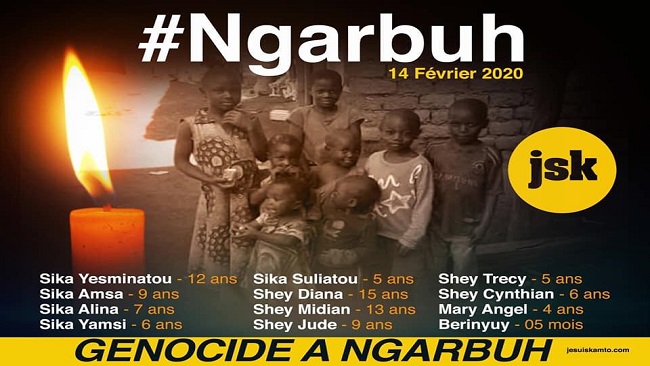Biya regime and the Ngarbuh Massacre: Ensure fair trial and participants’ safety; prosecute all responsible
The trial of three security force members accused of being involved in the massacre of 21 civilians in Ngarbuh, in Cameroon’s North-West region, is due to begin on December 17, 2020. It is expected to be an important step in tackling impunity.
The Ngarbuh killings, on February 14, 2020, were one of the worst incidents of abuse by Cameroonian security forces since the crisis in the country’s Anglophone regions began in late 2016. Two soldiers and a gendarme have been arrested and charged with murder, arson, destruction, violence against a pregnant woman, and disobeying orders. Seventeen members of a vigilante group and a former separatist fighter have also been charged but remain at large. While senior security force officers who may bear command responsibility have not been arrested or charged.
“Survivors and family members of those murdered in Ngarbuh are finally a step closer to getting justice,” said Ilaria Allegrozzi, senior Africa researcher at Human Rights Watch. “Ensuring a fair trial for those accused of the killings – one that is open to the public and where all those participating feel comfortable that their security is guaranteed – will be crucial in helping to end the cycles of violence and impunity that have plagued the Anglophone regions for the last four years.”
The government initially denied the army was responsible for the killings and embarked on a smear campaign against human rights organizations and media that had exposed the massacre. But on March 1, 2020, following international pressure, including from France, President Paul Biya agreed to create a commission of inquiry. On April 21, the Cameroon government admitted their security forces bear some responsibility for the killings and in June announced the arrest of the two soldiers and a gendarme.
Human Rights Watch found that government forces, including members of the Rapid Intervention Battalion, the Israeli-trained elite unit of the Cameroonian army, and armed ethnic Fulani killed 21 civilians in Ngarbuh, including 13 children and a pregnant woman, burned five homes, looted scores of other properties, and beat residents. Witnesses told Human Rights Watch that there was no confrontation between armed separatists and security forces in Ngarbuh and that the killings were deliberate and aimed at punishing a population accused of harboring separatist fighters.
Human Rights Watch has expressed concerns over some of the government investigation’s key findings, including claims that 5 of those killed were separatist fighters and that 13 civilians were killed in crossfire. The government commission of inquiry said the military attempted to cover up their acts by burning homes and filing a false report.
“The government commission’s findings cut the line of responsibility too far down, going after low-ranking soldiers and omitting that those soldiers acted following orders they received from their hierarchy,” Richard Tamfu, one of the lawyers representing the victims, told Human Rights Watch. “The trial should be the opportunity to identify all those responsible for the heinous killings of civilians in Ngarbuh, including those who ordered the massacre and anyone higher up in the chain of command.”
Witnesses and local human rights activists said that several witnesses were forced to flee Ngarbuh in the days following the attack, after security force members threatened and intimidated them. Some are still living in hiding.
The trial will be held at a military court in Yaoundé, Cameroon’s capital. Five lawyers are to represent the victims and their families, who may be in the courtroom. But it remains unclear if they will have the resources and protection necessary to make the trip. Their lawyers told Human Rights Watch that they are working on a voluntary basis and are struggling to find the necessary resources to make sure their clients can attend the trial.
Cameroonian authorities, with the support of partners, including the United Nations, should work to ensure that civil parties are present in court throughout the trial and guarantee the safety of all those participating in the proceedings, including the defendants, victims, witnesses, and human rights activists and journalists involved with the trial, Human Rights Watch said.
Ngarbuh was not an isolated case, but part of a long history of military abuses in the Anglophone regions. Impunity has been a key driver of the Anglophone crisis and there has been little to no accountability for serious crimes committed by both government forces and armed separatist fighters. To more meaningfully address the impunity gap, judicial authorities should look beyond the three security force members currently facing charges and seek to investigate and prosecute senior officials who may bear command responsibility, if they knew or should have known about the killings but took insufficient measures to prevent them or punish those responsible, Human Rights Watch said.
“The progress represented by this trial is substantial, but still only one piece of fighting impunity in Cameroon’s Anglophone regions,” Allegrozzi said. “Senior-level commanders have yet to be charged, and the families of many other victims are still awaiting justice for crimes committed by all sides.”
Culled from Human Rights Watch





